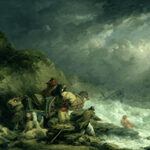Bard SummerScape
The Wreckers
By Ethel SmythAmerican Symphony OrchestraConducted by Leon Botstein, music directorDirected by Thaddeus Strassberger
July 24, 2015
Bard SummerScape
July 24, 2015


Looking for the 2020 UPSTREAMING presentation of The Wreckers? Click here to watch!
Ethel Smyth’s The Wreckers is based in historical fact: in small, desperately poor villages on Britain’s Cornish coast, bands of villagers formed secret cadres that at critical moments would extinguish the beacons established on the coast to guide ships, thus forcing them onto the rocks and then plundering the cargo and murdering the crews.
Notifications